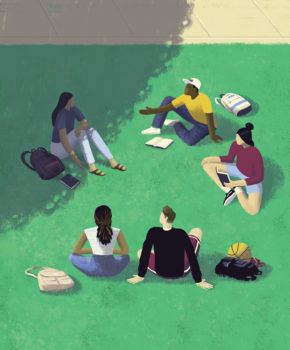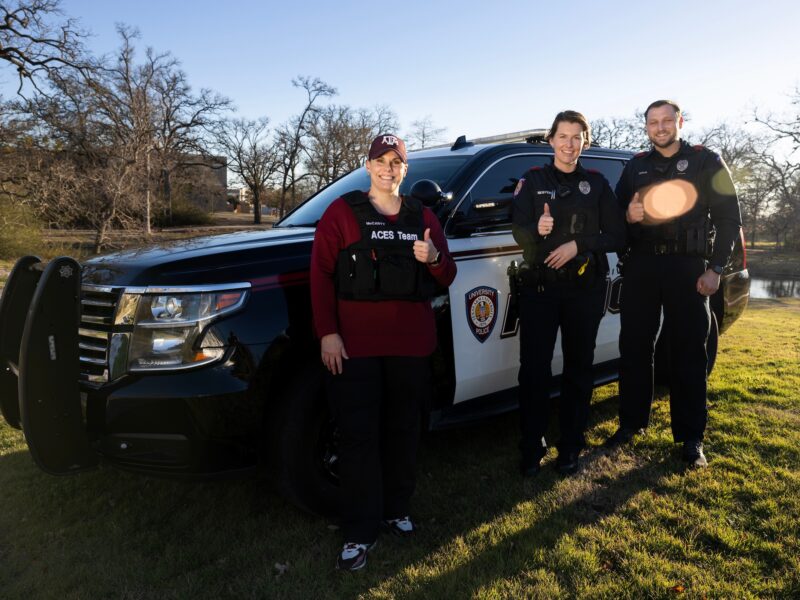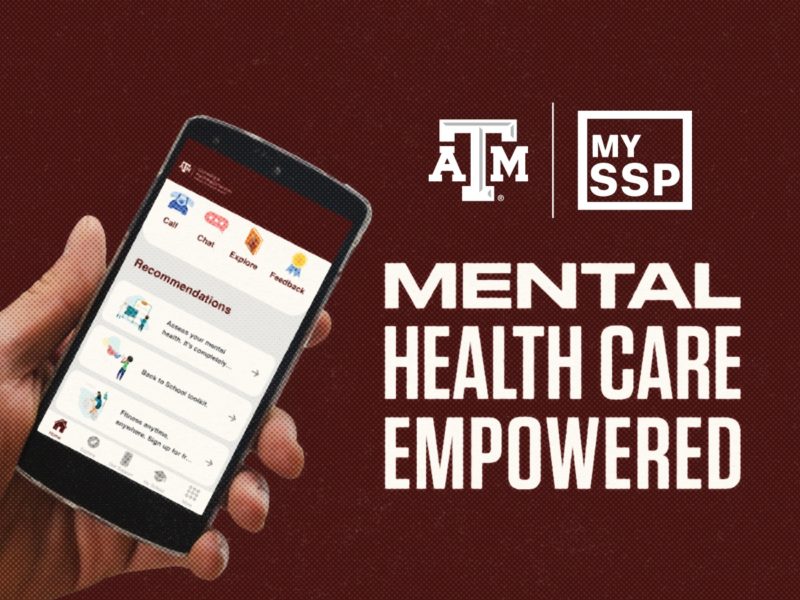Out Of The Dark

Point to social media, shifting cultural norms, COVID-19, all of the above or something else entirely. No matter the cause, discussion around mental health has taken a decisive turn in recent years. Not long ago, therapy was often treated as a shame-laden secret, mentioned in hushed tones if at all. Today, especially among younger generations, the practice is positively viewed as a practical tool for self-improvement.
The popular reframing of mental health as an essential part of one’s overall wellness has worked wonders for removing its stigma, which has historically been among the biggest obstacles to diagnosing and adequately caring for common mood, anxiety and eating disorders. Still, according to Mary Ann Covey ’92, some old obstacles remain, and a few new ones emerge.
Covey became director of Texas A&M University Counseling and Psychological Services (CAPS) in 2018 but had been with the program her entire career. “I’ve seen students’ mental health needs change over time,” she said. Before COVID-19, the university’s steady growth left CAPS staff struggling to meet students’ demand for counseling services. Since the pandemic’s onset, that demand has only risen as Aggies dealt with isolation under social distancing measures amid the usual stresses of college life.
Early after COVID-19’s arrival, the American Psychology Association warned of a “second pandemic” of mental health problems spreading across the nation. While definite research on these large-scale effects is scarce, Covey has noticed some anecdotal patterns in dealing with students firsthand. “It stunted their ability to connect with each other,” she said. This year, many incoming freshmen had spent much of their junior and senior years of high school online, for instance. “There was a lag in development. The overall effect was that students didn’t know how to communicate during personal conflicts.”
A plethora of students sought CAPS counselors for help with relatively small dilemmas, like resolving roommate disputes, and larger ones, like processing sociopolitical tensions. Meanwhile, students grappling with long-term psychological diagnoses still called upon CAPS for regular mental health care. Using these CAPS resources and programs, Covey and her team encourage students from all backgrounds and situations to ask for care from others and empower them to care for themselves.
HelpLine
Founded in 1995, HelpLine is uniquely designed to help students when they need it most. Staffed by current and former student volunteers supervised by CAPS staff, HelpLine is an after-hours phone service that answers calls from Aggies seeking peer support, crisis intervention and campus resources.
Students can call the HelpLine (979.845.2700) from 4 p.m. to 8 a.m. on weekdays and 24 hours a day on weekends when school is in session. While volunteers are trained to support callers with suicidal thoughts, the service is not exclusively a suicide hotline, as students can and often do call to simply talk through their issues with a friendly stranger.
Susan Vavra ’93, HelpLine’s director since its founding, extolls the service as a means for Aggies to help other Aggies. “I think it’s beautiful what HelpLiners do for the campus community,” she said, “but they also learn so much about service to others.” Many volunteers use their experience to pursue a career in mental health care, while others gain valuable people skills for everyday life.
Awareness among students has always been HelpLine’s most pressing need, and Vavra welcomes any signal boost from former students and parents. For those wanting to support the HelpLine monetarily, the Houston A&M University Mothers’ Club—the largest club for mothers of current and former Aggie students—established a $25,000 endowment in 2014 to supply funds to advertise the service and grant volunteers better amenities. You can give online to grow the endowment at give.am/HoustonMCHelpLine.

Individual And Group Counseling
As the “C” in its name implies, counseling is CAPS’ bread and butter. But even when working at maximum capacity, it simply does not have ample staff to provide regular individual sessions for every Aggie who requests them. “With more than 70,000 students, we are limited in what we can offer,” Covey said. “If we prioritized students who came in early in the semester and saw them enough times to give them the highest quality treatment, we wouldn’t be available for anyone who showed up later.” This “early bird” approach would prove especially problematic, as demand consistently spikes around midterms and finals.
To provide the best care possible to the most students, CAPS has spent the last few years building up its group counseling infrastructure. Most groups are specialized to bring together students dealing with common problems like grief, anxiety, self-worth or identity-related issues in meetings led by trained counselors.

Another game-changer recently arrived in CAPS’ partnership with the My Student Support Program. My SSP provides students with confidential, real-time virtual counseling from a network of professionals available 24/7 through a phone app, among other resources. While HelpLine will still play a vital role for Aggies needing support, My SSP promises to bridge the accessibility gap for students dealing with psychological crises.
Diversity And Inclusion
Aggies come from every state, six continents and all walks of life. And while Texas A&M proudly serves its diverse student body, many students from marginalized populations often face unique challenges during their college journey. For Covey and CAPS, that means designating resources that meet these students’ specific needs and making spaces where they can share and process their experiences.
At the center of CAPS’ diversity efforts is the Let’s Talk program, an outreach initiative that organizes discussions for students of color, international students and LGBTQ+ students in safe and empowering environments. “We’re very proactive in trying to reach students who historically don’t use counseling as much as other students,” Covey said. If a student participating in a Let’s Talk discussion finds they could use further CAPS services, for example, they can ask for a referral to receive the right support.
Suicide Awareness And Prevention
No one likes to talk about it, but Santana Simple ’08 ’10 maintains that suicide is a public health issue that Aggies cannot ignore. It is the second most common cause of death on American campuses, right behind car accidents. Simple leads CAPS’ suicide awareness and prevention efforts, which focus on educating students, faculty and staff on recognizing the signs of suicidal ideation and meaningfully intervening.
“You can offer support like anyone else,” Simple said. “That doesn’t mean the onus is on us to solve others’ problems, and it doesn’t always look like sitting and talking with someone for three hours.” In CAPS’ open suicide prevention and awareness trainings, participants learn the Question, Persuade and Refer (QPR) approach, analogous to CPR in its ease, accessibility and lifesaving potential.
In addition to training sessions, CAPS also organizes an annual Suicide Awareness Month and recently debuted Aggies Reaching Aggies, a peer initiative that brings together groups of students who are passionate about educating other Aggies about suicide prevention. Simple invites former students in the College Station area to volunteer for both initiatives and encourages those farther from Aggieland to volunteer for the American Foundation for Suicide Prevention if they are interested in making a similar impact.
Lend a Helping Hand
If you would like to assist CAPS in addressing Aggies’ most pressing mental health needs, consider engaging in the giving and volunteer opportunities below and stay up to date through the program’s social media channels.
- Volunteer for Aggies Reaching Aggies
CAPS’ Suicide Awareness & Prevention Office is looking for former student volunteers in the College Station area to assist in its peer educator program. Email aggiesreach@caps.tamu.edu for more information about how you can get involved.
- Give to the CAPS Excellence Fund
The CAPS Excellence Fund supports Suicide Awareness & Prevention programs as well as overall mental health initiatives for Aggies. You can make direct contributions to the fund at give.am/CAPS.
- Become a HelpLine Volunteer
HelpLine is actively recruiting responsible, dependable people in the College Station area who are willing to be trained extensively to provide a nonjudgmental listening ear to Aggie callers. For more information, visit caps.tamu.edu/helpline.
- Donate to the Houston A&M University Mothers’ Club HelpLine Endowment
Established in 2014, this endowed fund bolsters HelpLine’s critical advertising efforts and provides amenities for volunteers. To donate to the HelpLine endowed fund, visit give.am/HoustonMCHelpLine.
This article by Bailey Payne originally appeared in the Spring 2022 edition of Maroon magazine.





